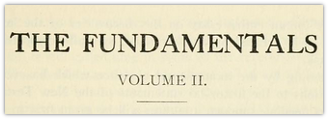A History of the Problem of Evil - Modern Philosophy
 Read the series so far.
Read the series so far.
Calvin (1509-1564)
Calvin resolutely disregards human volition as a means of absolving God for evil’s existence, and thus rejects earlier mainstream theodicies. In Ockham, however, Calvin finds an agreeable response to the problem, and builds upon Ockham’s foundation—his conception of good. Calvin minces no words when describing the root of good:
The will of God is the supreme rule of righteousness, so that everything which he wills must be held to be righteous by the mere fact of his willing it. Therefore, when it is asked why the Lord did so, we must answer, Because he pleased. But if you proceed farther to ask why he pleased, you ask for something greater and more sublime than the will of God, and nothing such can be found.1





Discussion